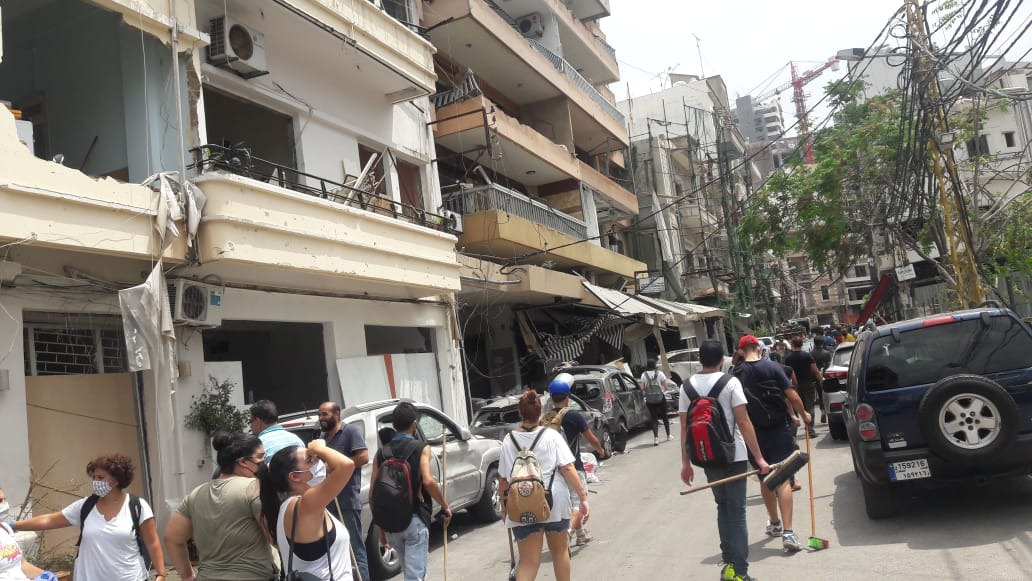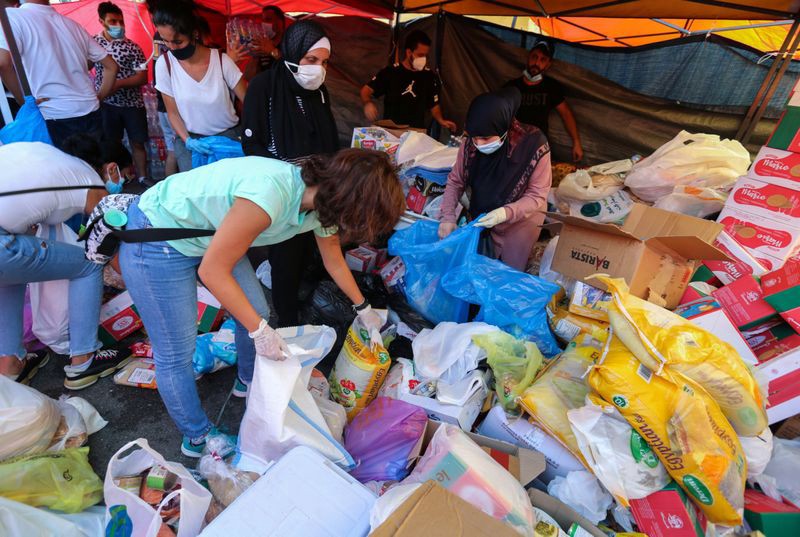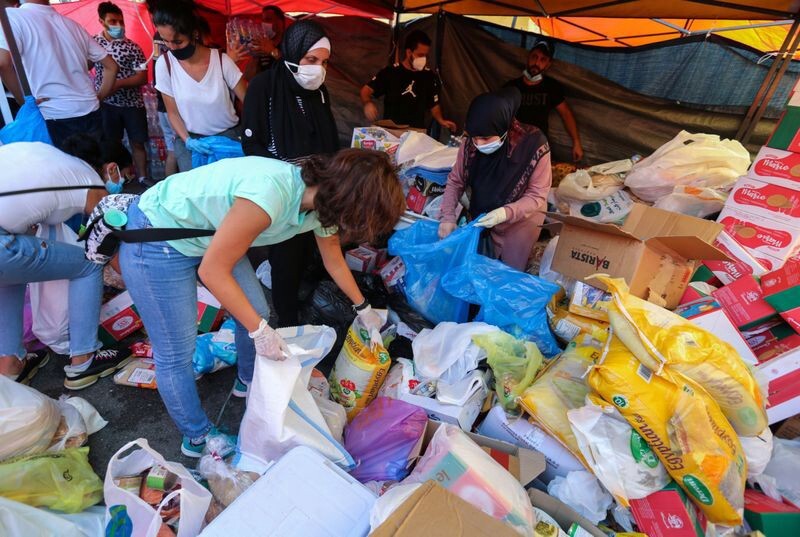Taking Our First Steps Together
I’m stuck in some of the worst traffic I’ve ever experienced. And I couldn’t be happier.
I’ve spent the past few days helping my colleagues at the Forum for Development, Culture and Dialogue compose emergency communications on the relief efforts to and with the citizens of Beirut. My typical route home takes me through Martyrs’ Square, a large area at the center of the city that was also the center of the protests this fall. These past few months, during the coronavirus pandemic and resulting lockdowns, it’s been quite empty. But now, it is full of life.
 As we drive, I see dozens of Beirutis on motorbikes hanging on to shovels and brooms while they drive. Groups in matching vests and masks walk together towards the neighborhoods of Gemmeyze, Mar Mikhael, and Karantina. As we get closer I can hear music blaring. I know if I were to hop out of this cab and walk a bit further, I’d see colorful tents set up with volunteers distributing sandwiches and water, cleaning materials and safety gear, and hygiene items, food parcels, and clothes to anyone who needs them.
As we drive, I see dozens of Beirutis on motorbikes hanging on to shovels and brooms while they drive. Groups in matching vests and masks walk together towards the neighborhoods of Gemmeyze, Mar Mikhael, and Karantina. As we get closer I can hear music blaring. I know if I were to hop out of this cab and walk a bit further, I’d see colorful tents set up with volunteers distributing sandwiches and water, cleaning materials and safety gear, and hygiene items, food parcels, and clothes to anyone who needs them.
This has been the scene at Martyrs’ Square since Wednesday, the morning after the explosion that shook Beirut on August 4, killing nearly 150 people, injuring over 5,000, and leaving 300,000 more homeless. Before the dust had even settled, people from all over Lebanon started contributing to relief efforts however they could — transporting people to hospital, treating wounds, cleaning up homes, bringing water and bread. Social media was flooded with opportunities to help, and the message was clear — grab a broom, a mask, and some gloves, and start cleaning. We need help everywhere.
I’ll admit, these first few hours were chaotic. And then something amazing started to happen. As the magnitude of the need really became apparent, organizations and individuals started assessing their skills and finding the particular way that they could help the most.
- Local bakeries are baking and donating bread by the truckful.
- Beirutis of all ages are lining up outside of hospitals to donate blood
- People outside Beirut are welcoming strangers into their homes and sending caravans of supplies to the city.
- Doctors, nurses, and even veterinarians are offering free first aid and basic medical care.
- Counselors are holding over-the-phone counseling sessions and sharing basic information about trauma and psychological first-aid on social media.
- Journalists are documenting the aftermath and recording the true stories of both people who lost homes and those who had come to help.
- Graphic designers are creating graphics, posts, and anything else that small community organizations may need.
- Activists have taken to the streets to demand accountability and transparency in the investigation of the explosion.
- Organizations with experience coordinating larger-scale projects are assessing damage and finding contractors and architects to work with to begin the rebuilding process.
- Even Toters, our beloved food delivery app, got involved — you can use their app to donate directly do a variety of Beirut-based NGOs at work on the ground.
And through it all, countless volunteers have gone from home to home across the city, shoveling piles of crumbling concrete and removing broken glass so that rebuilding can begin and residents can return home as quickly as possible.
Right after the explosion, when the pictures and statistics started flooding my Twitter and Instagram feeds, I was so overwhelmed I could barely breathe. The amount of destruction, the extent of the need — how would Beirut ever even begin to recover? Where did we even start?
Humans are complex. We have a lot of needs. When we experience trauma, there are so many different facets of aid that we require to begin to recover. The city of Beirut is complex. The problems Lebanon faces are not simple and require more than a one-size-fits-all solution. Watching the response to crisis the past few days, I can’t help but think of 1 Corinthians 12.
“The way God designed our bodies is a model for understanding our lives together as a church: every part dependent on every other part, the parts we mention and the parts we don’t, the parts we see and the parts we don’t. If one part hurts, every other part is involved in the hurt, and in the healing. If one part flourishes, every other part enters into the exuberance.”
(1 Corinthians 12:25–26, The Message)
 As I watched this first wave of haphazard cleaning and aid unfold, I was overwhelmed by what I perceived as the chaotic response. The part of myself that has learned how to work with nonprofits and churches wanted nothing more than to organize everyone into teams and committees and track all their progress in an Excel spreadsheet. But what I have learned in the past few days is that I was missing the bigger picture. This is not an either/or situation. We need the brave first responders who are willing to act first and ask questions later AND the organizations who are setting up “base camps” around the city to coordinate aid. We need the volunteers cleaning rubble out of homes AND the engineers and contractors who are taking the time to assess the damage and make plans. We need groups in Beirut making sandwiches to hand out to volunteers today AND groups of ex-pats organizing food and supply drives to ship to Beirut in a few months. We need treatment for the symptoms of acute trauma AND the long-term psychological and emotional impacts of experiencing a tragedy of this size. We need doctors stitching up wounds tonight, neurologists monitoring and treating concussions, AND researchers studying the long-term effects of nitrous oxide on the body. And what I have seen is, when given the chance to help, people find their niche. They find the way to contribute that makes the most sense for them.
As I watched this first wave of haphazard cleaning and aid unfold, I was overwhelmed by what I perceived as the chaotic response. The part of myself that has learned how to work with nonprofits and churches wanted nothing more than to organize everyone into teams and committees and track all their progress in an Excel spreadsheet. But what I have learned in the past few days is that I was missing the bigger picture. This is not an either/or situation. We need the brave first responders who are willing to act first and ask questions later AND the organizations who are setting up “base camps” around the city to coordinate aid. We need the volunteers cleaning rubble out of homes AND the engineers and contractors who are taking the time to assess the damage and make plans. We need groups in Beirut making sandwiches to hand out to volunteers today AND groups of ex-pats organizing food and supply drives to ship to Beirut in a few months. We need treatment for the symptoms of acute trauma AND the long-term psychological and emotional impacts of experiencing a tragedy of this size. We need doctors stitching up wounds tonight, neurologists monitoring and treating concussions, AND researchers studying the long-term effects of nitrous oxide on the body. And what I have seen is, when given the chance to help, people find their niche. They find the way to contribute that makes the most sense for them.
I want to be clear: The explosion that occurred on August 4 was a tragedy. It should not have happened. We would be better off today if nothing of note occurred on the evening of August 4. And this first stage of rebuilding is just that — a first step. More money, more aid, and more people will surely be needed as we begin to ascertain the true extent of the damage. At the same time, what I have witnessed in the past few days is truly a city working as one body, with each person a limb, sharing their gifts to begin to heal together. I am absolutely devastated by what occurred on August 4. And when I am at my lowest points, I look to the community around me to find hope to continue.
Leda Zakarison serves with the Forum for Development, Culture, and Dialogue, Beirut, Lebanon. Her appointment is made possible by your gifts to Disciples Mission Fund, Our Church’s Wider Mission, WOC, and your special gifts.

